The phrase not to give, care or be worth a tinker¹’s curse, cuss² or damn (or elliptically a tinker’s) is an intensification of not to give, care or be worth a curse, cuss or damn, with reference to the bad language reputedly used by tinkers. The low repute in which tinkers were held is also shown by expressions such as to swear like a tinker and as drunk, or as quarrelsome, as a tinker. In A Dictionarie of the French and English Tongues (London, 1611), Randle Cotgrave translated
Il iure comme vn Abbé; chartier; gentilhomme; prelat (= He swears like an abbot; carter; gentleman; prelate)
as
Like a Tinker, say we.
¹ The noun tinker denotes an itinerant craftsman who mended pots, kettles and other metal household utensils. In Scotland, northern England and Ireland, the word and its variant tinkler were the ordinary names for a gipsy. The travelling gipsies’ chief ostensible business used to be the sale or mending of pots, kettles and metalware generally. The word tinker was also broadly applied to itinerant beggars, traders and performers.
² The form cuss represents a regional or colloquial pronunciation of curse.
In The Scottish Gallovidian Encyclopedia. Or, The original, antiquated, and natural curiosities of the south of Scotland (London, 1824), the engineer and poet John Mactaggart (1791-1830) illustrated
Balderdash—Nonsense—foolery.
with a poem titled Sir Balderdash, containing the following stanza:
O! Madam was a blooming wench,
And gabbed night and day;
A tinkler’s curse she did na care
What she did think or say.
I have found an early instance of the phrase in the Westmorland Gazette (Cumbria) of 23rd October 1830:
As to Goulburn’s free trade beer bill, it never was worth a tinker’s curse from the commencement up to the present time, and never will be, nor will it ever benefit the country one halfpenny.
Another early instance is found in The Courier (London) of 14th December 1833:
Several paupers who had been sent to work on the grounds of Mr. Waddington, at Sydenham, in Kent, having returned to their parishes and complained of the fare and treatment there, the Lord Mayor sent for the Gentleman who was to have given them employment, and entered upon an investigation into the merits of the complaint. […]
One of the paupers said—Please you my Lord, the beer is very queer, for Mr. Waddington gives it so heavy a dash of Adam’s ale [= water] that, saving your presence, it is not worth a tinker’s damn.
A variant appeared in the column Law Intelligence of The Daily News (London) on 24th April 1884:
Mr. Justice Butt: You had better be careful, sir, for there is such a thing as sending a man to prison for impertinance [sic].—Mr. Pole: I don’t care two tinkers’ straws if you do (snapping his fingers).
Edward H. Knight (1824-83), patent lawyer and expert in mechanics, proposed an alternative origin of the phrase in Knight’s American mechanical dictionary. A description of tools, instruments, machines, processes, and engineering; history of inventions; general technological vocabulary; and digest of mechanical appliances in science and the arts (volume 3 – Boston, 1876):

Tinker’s-dam. A wall of dough raised around a place which a plumber desires to flood with a coat of solder. The material can be but once used; being consequently thrown away as worthless, it has passed into a proverb, usually involving the wrong spelling of the otherwise innocent word “dam.”
But this theory is erroneous, as it does not take into account the early variant with curse, which identifies the original form as damn, not dam.
